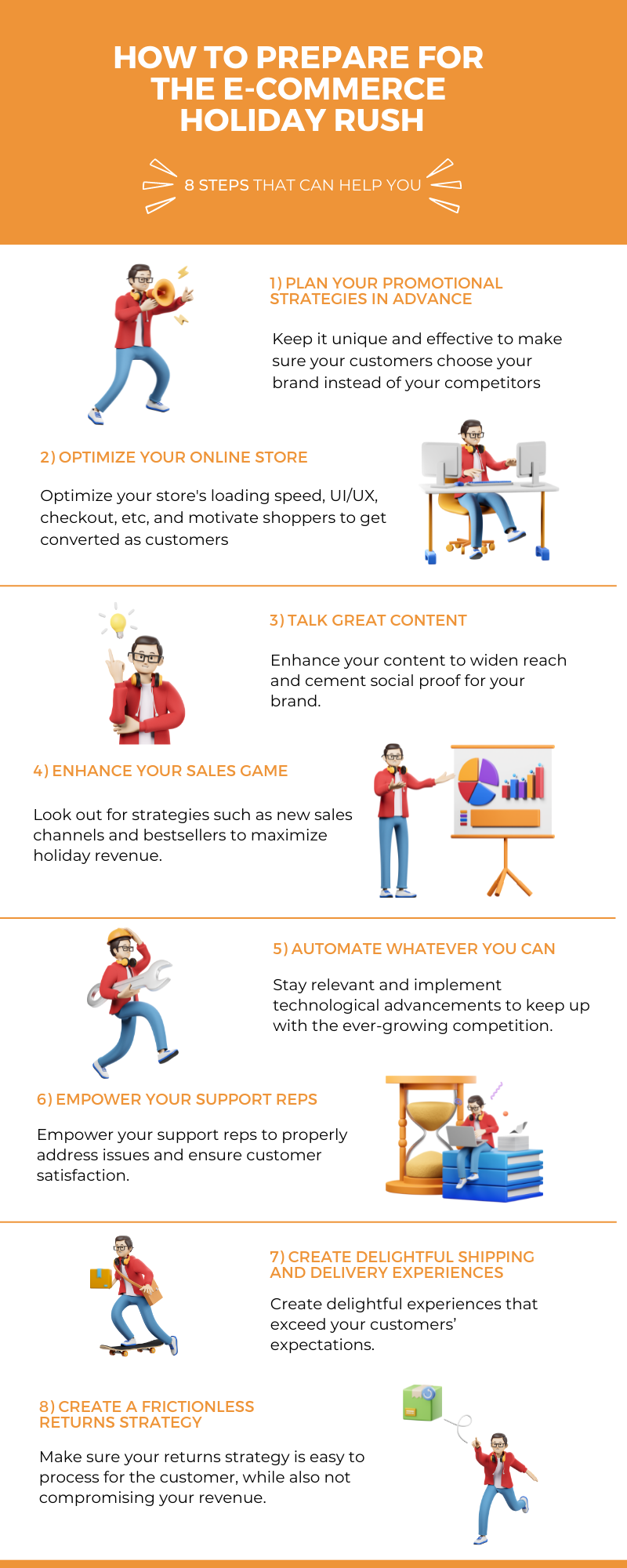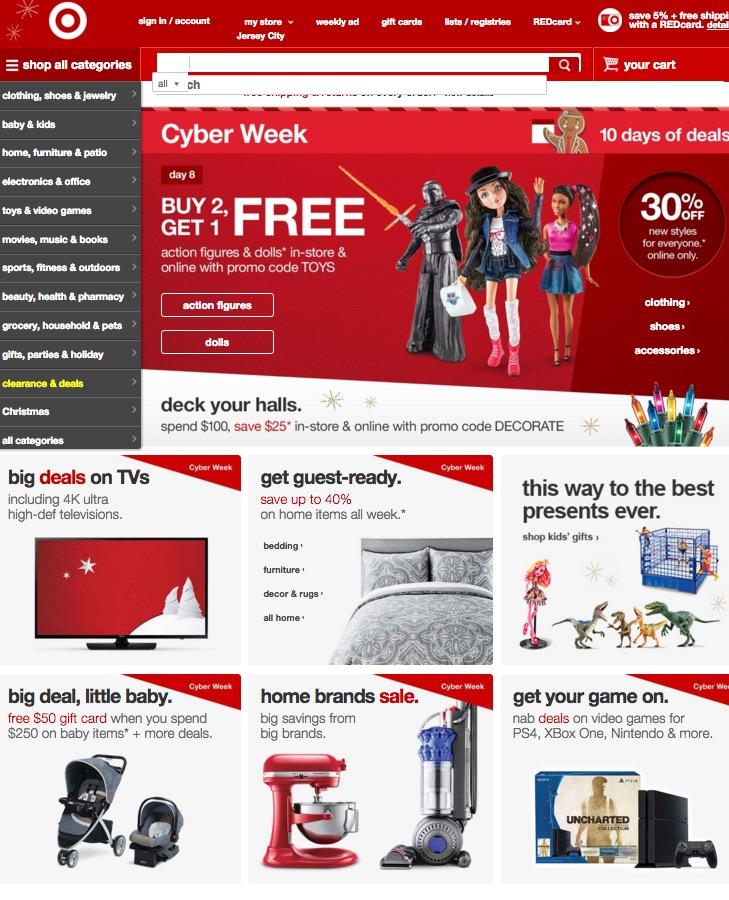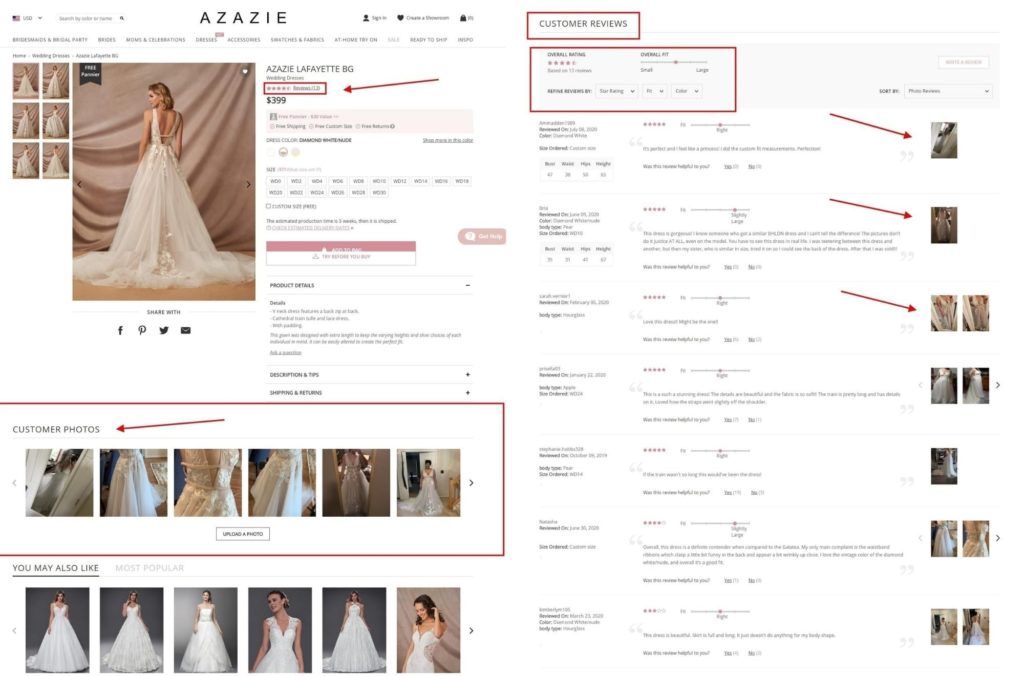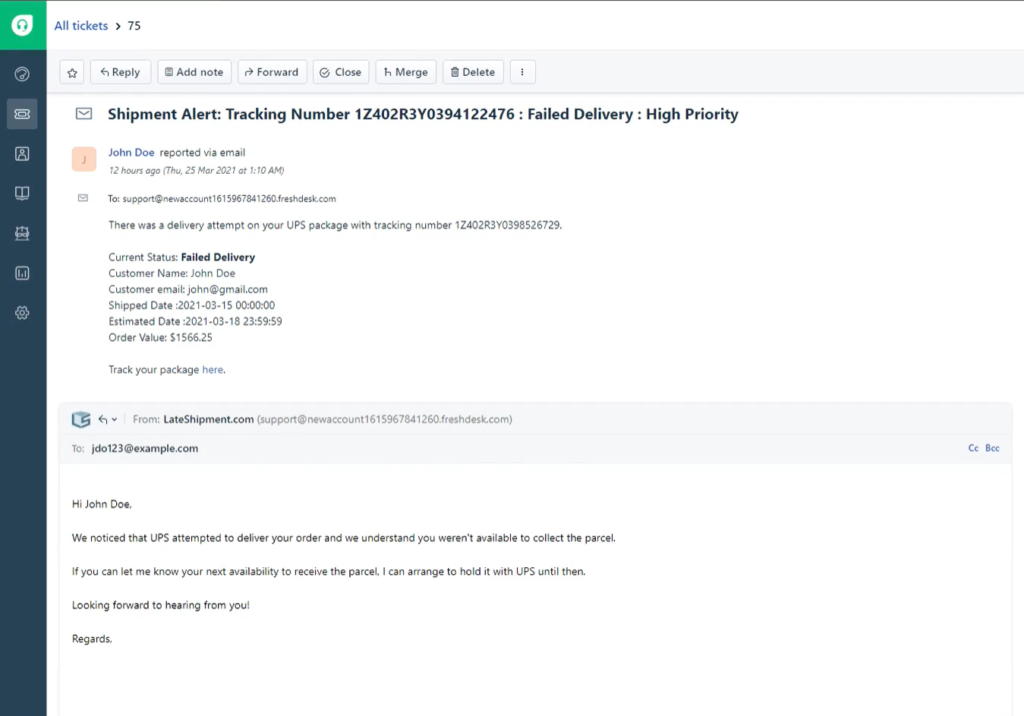Less than 2 months to go for the holiday season to officially kick off — which means as an e-commerce retailer, you have to make use of the little prep time left to get better equipped at handling the holiday rush. Here are some tips categorized via different stages of the customer journey to help you do just that.

Pre-purchase: Awareness and Exploration
1. Plan your promotional strategies in advance

The holiday season is the best time to spread the word about your product and e-commerce business. However, it can be difficult amidst your competitors trying the same thing. This is why you need to be unique with your promotional campaigns.
For starters,
- Bring the whole holiday spirit across your website and marketing campaigns to let customers know that you’re relevant.
- Keep posting interactive content on your Social channels to catch the viewers’ attention
- Add a touch of personalization in your conversations to make sure that your brand is at the top of their minds.
- Provide timely offers and discounts across different funnel stages to increase your chances of sales and repeat sales and reduce cart abandonment.
- Influencer partnerships and event marketing to spread the word about your product on a larger scale and increase your lead base.
2. Optimize your online store

If your online store’s website or application is ineffective to handle the holiday rush, then all your promotional efforts just go down the drain. Therefore, keep in mind to optimize your website and motivate shoppers to get converted as customers.
Here’s how you can do it right before the holiday season:
- Increase website load speed
- Optimize the User Interface and Experience (UI, UX)
- Enable seamless checkout
- Proper and interactive content.
3. Talk great content

One of the things that go well with a great-looking website or application is content — which needs to complement each other to enhance brand content and widen reach.
Your content is your key to the locked doors of holiday shoppers’ hearts. Therefore, take care of it before the holiday rush gets into action.
Here are some suggestions that you can keep in mind:
- Fill your content with relevant holiday-aligned keywords to increase your ecommerce site’s traffic.
- Include User-Generated Content (UGC) in your content strategy to cement social proof for your e-commerce business.
- Add product reviews and customer testimonies to make your brand seem trustworthy.
- Keep your content holiday-themed and make it interactive to engage with shoppers who visit your online store.
Purchase: Conversion
4. Enhance your sales game

The holiday season is your chance to make more sales than the rest of the year combined. Therefore, look out for strategies that help you make use of the holiday rush and maximize revenue.
When it comes to your sales strategies, here are some areas that you can cover:
- Open doors to new sales channels like marketplaces, to reach customers where they spend most of their time (Amazon, Instagram, TikTok, etc).
- Make effective use of social commerce to improve brand recognition and increase incoming order rates.
- Identify your industry products that are the “buzz” or “sensation” for this year’s holiday season, ensure you have proper stock of them, and promote them as your bestsellers.
- Use the holiday rush as an opportunity to cross-sell products that might go along great with their recent purchases.
5. Automate whatever you can
In the retail e-commerce space, it is always wise to stay relevant and implement technological advancements if you need to keep up with the ever-growing competition. One of such technology trends is to automate specific areas of your existing business operations to make your process efficient.
Here are different business areas where you can introduce automation:
- Automate email and SMS notifications for different transactional shipping events such as order shipped, in transit, delivered, etc.
- Keep track of your inventories and avoid over-stock and out-of-stock issues with the help of an Inventory Management solution or a Third-party logistics (3PL) partner, who can help automate logistics.
- Automate customer support by incorporating chatbots into your mix and make issue resolution self-service.
- Make returns management automated by integrating with a system that centralizes returns and enables easy configuration, management, and tracking.
Post-purchase: Loyalty
6. Empower your support reps

The holiday rush makes your customers increasingly anxious regarding their orders. This leads them to bombard your support reps with repeated order status inquiries and consumes all of your team’s time.
Therefore, it is time to empower your support reps to properly address customer issues and display your strong commitment to the high standard of customer service you offer. Here’s how you can do just that:
- Enable a live chat option 24/7 to ensure faster issue resolution with low or even zero support interactions.
- Empower your support team to proactively resolve issues and take preemptive action before discrepancies impact your customers.
7. Provide delightful shipping and delivery experiences
Your customers hitting the ‘buy’ button is only half of the job done. There’s an entire phase of the customer journey called ‘the post-purchase experience (shipping, delivery, and returns)’ left that plays a great role in your CX efforts.
Focusing on your post-purchase experiences, particularly during the holiday rush is not just an option because 1-in-3 customers will stop shopping with a brand after just ONE instance of a bad post-purchase experience.
Here are some ways for you to optimize your shipping and delivery experiences. We’ll focus specifically on returns later:
- Partner with multiple shipping carriers (FedEx, UPS) and provide multiple delivery options (two-day, BOPIS) to manage incoming shipping volumes and reduce the odds of delivery delays.
- Employ real-time shipment tracking to enable customers to seamlessly track their orders via order tracking pages and know what’s happening at a glance.
- Keep your customers in the loop of their orders throughout the delivery lifecycle and mitigate their anxiety.
- Delight your customers by providing on-brand order tracking experiences via shipping notifications and tracking pages.
- Regularly collect delivery feedback from your customers to make better shipping decisions and improve customer loyalty.
8. Create a frictionless returns strategy
Up to 30% of eCommerce orders are returned and 96% of the customers will shop with a store again if it offers seamless returns and exchanges. Therefore, make sure your returns strategy is easy to process for the customer, while also not compromising your revenue.
Here’s how you can do it:
- Draft a clear-cut returns policy that is neither too strict to repel customers nor too lenient to encourage fraudulent returns.
- Make returns easy and seamless for your customers with faster returns initiation and frictionless returns status tracking.
- Provide flexible return methods such as exchanges and store credits to convert returns into repeat purchases.
Bottom Line
As we mentioned earlier, the holiday season is a time when the rush is high and you can bring in more sales.
Therefore, it is incumbent upon you to focus on the tips, highlighting different areas of the customer journey to provide memorable experiences (CX) this Holiday season.
Preparing for the upcoming holiday rush is just one part of the Holiday season. There’s more to do if you’re looking to get your hands on a great holiday season sale.
Make use of our e-commerce holiday sales checklist — a collection of strategies, along with relevant factual and unbiased insights that help you maximize holiday sales in 2022, at a time when inflation is having an impact on consumer spending.
Download, read through, and let us know your feedback on how helpful it was for your business. Feel like we’ve missed something? Share that as well, so that we can make improvements.






![Holiday Season Marketing Calendar and Shipping Deadlines [2021] Blog Header](https://lswordpress.s3.amazonaws.com/blog/wp-content/uploads/2021/08/17065221/Holiday-Season-Marketing-Calendar-and-Shipping-Deadlines-2021-Blog-Header-420x280.png)